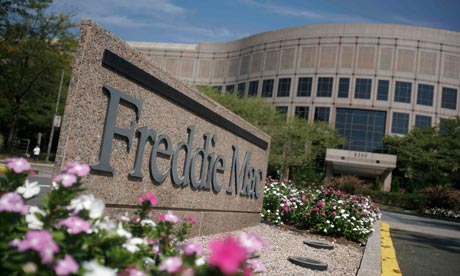
US taxpayers warned Fannie Mae and Freddie Mac may need $363bn bailouts
Edward Helmore

US regulators have warned that taxpayers may end up absorbing losses of $363bn (£231bn) from bad mortgage loans – the latest sign that problematic lending practices that triggered the 2008 banking crisis continue to buffet the US.
The issue, which has flared anew this month with a ban on the resale of foreclosed homes after flaws in the legal processes were exposed, has led investors to voice fears of second housing-related crisis.
This week, Bank of America (BoA) shares plunged on concern about the impact of legal challenges to foreclosures after the bank announced it was resuming sales of repossessed homes. Investors warn that the bank's exposure to bad mortgages could depress its stock for years to come, perhaps falling from the current $11 to $2.50 by 2013.
BoA, through its troubled Countrywide Financial unit, is under further pressure from mortgage-bond investors who claim poor mortgage lending practices entitles them to refunds that could reach $200bn.
The Federal Housing Finance Agency has now warned that the government-guaranteed funds Fannie Mae and Freddie Mac, which have already absorbed $148bn in bail-outs, may now need up to $363bn under worst-case predictions.
With home prices experiencing their worst fall since 1930 by some estimates, claims are likely to soar. Pension fund and private equity firms including Pimco and BlackRock, as well as the Federal Reserve Bank of New York, are moving to force BoA into repurchasing $47bn in bonds, though BoA's chief executive officer Brian Moynihan insists that most claims can not demonstrate "the defects that people allege".
The issue of re-purchasing securitised mortgages has placed the banking system under renewed stress for investors. BoA's stock has declined 22% this year, compared to 8% for JPMorgan Chase and a 23% gain for Citigroup, at one point the weakest of the US banking companies.
Oct. 21, 2010
